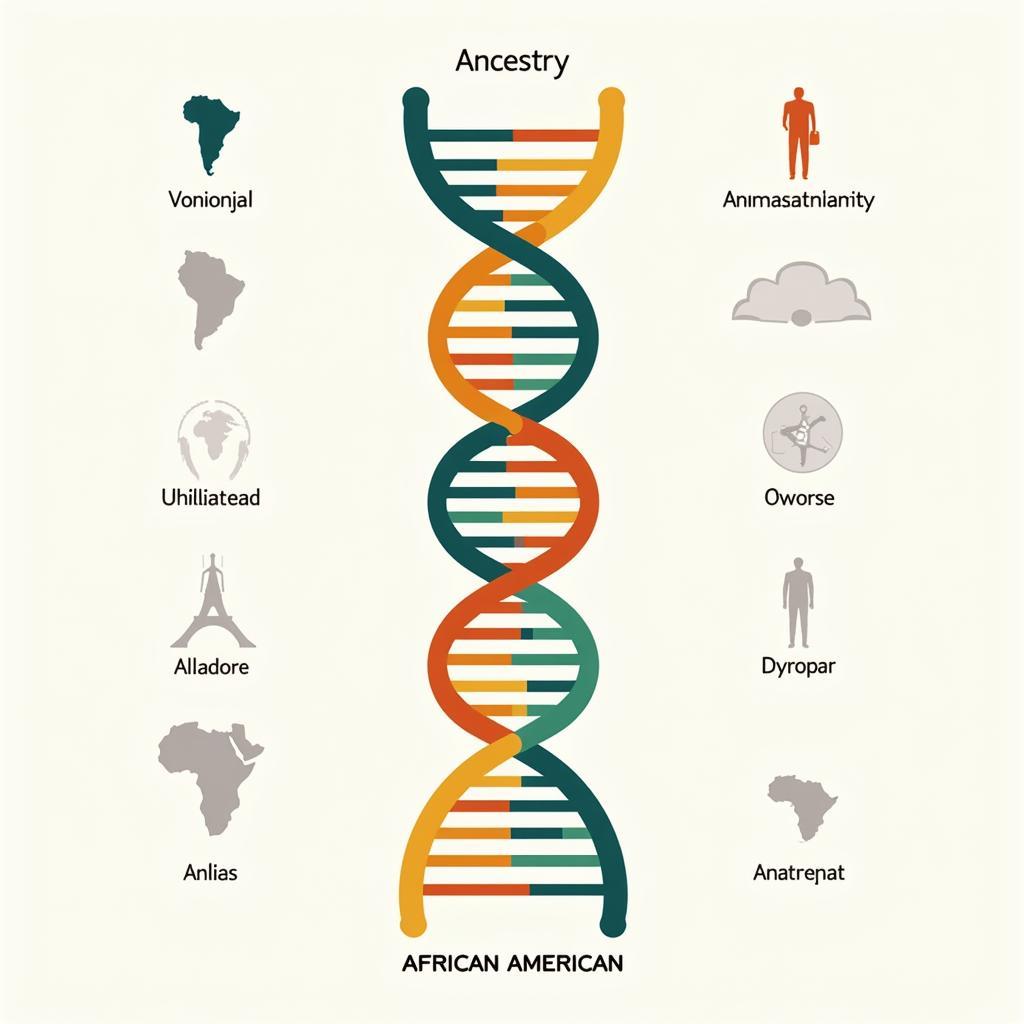Unraveling African American Genomics: A Journey Through DNA
African American Genomics offers a powerful lens into history, identity, and health. It unravels the complex tapestry of ancestry woven through migration and admixture, providing valuable insights into both the past and the future. This exploration delves into the unique genetic landscape of African Americans, uncovering its significance in understanding health disparities and personalized medicine.
The Significance of African American Genomics
 African American DNA Ancestry Chart
African American DNA Ancestry Chart
African American genomics research helps to understand the genetic basis of health disparities that disproportionately affect this population. Conditions like diabetes, hypertension, and certain cancers show different prevalence and progression patterns in African Americans compared to other groups. By studying these genomic differences, researchers can identify specific genetic markers that contribute to disease risk and develop targeted interventions for prevention and treatment. This is crucial for moving towards a more equitable healthcare system. Further, African American genomics provides invaluable information about the historical migrations and admixture events that shaped the African diaspora. It allows researchers to trace ancestral lineages back to specific regions of Africa, illuminating the complex history of forced migration and cultural exchange.
The field of genomics also helps us understand the incredible diversity within the African American population itself. Not all African Americans share the same genetic background. Individual genomic profiles can vary significantly due to different ancestral origins within Africa and varying degrees of European and Native American admixture. This diversity emphasizes the importance of personalized medicine, tailoring treatments to individual genetic makeup for optimal effectiveness.
Exploring Genetic Diversity and its Implications
African American genomics reveals a rich tapestry of genetic diversity, shaped by a complex history. Understanding this diversity is essential for developing personalized medicine approaches and addressing health disparities. Analyzing genomic data helps uncover unique genetic variations that may influence drug responses, disease susceptibility, and overall health outcomes within the African American community. This knowledge empowers healthcare professionals to tailor treatments and preventive strategies based on individual genetic profiles.
How Does This Impact Personalized Medicine?
Dr. Anika Obiora, a leading geneticist at the Center for African Genomic Studies, explains, “African American genomics research holds the key to unlocking personalized medicine for this population. By understanding the unique genetic variations within this group, we can develop more effective and targeted treatments for various diseases.”
The implications of this research extend beyond individual health. By analyzing population-level genomic data, researchers can gain insights into the genetic history of the African diaspora, tracing migration patterns and uncovering ancestral origins. This information can be invaluable for reconstructing historical narratives and understanding the complex interplay of genetics, culture, and identity.
african genetic diversity implications
Addressing Health Disparities Through Genomic Research
Genomic studies can help to pinpoint the genetic factors that contribute to health disparities, allowing for the development of targeted interventions and public health strategies. By understanding these genetic influences, researchers can work towards reducing health inequities and improving health outcomes within the African American community. This research also highlights the importance of considering social and environmental factors alongside genetic ones in addressing health disparities.
The Future of African American Genomics
 Future Directions in African American Genomic Research
Future Directions in African American Genomic Research
The future of African American genomics research holds immense promise. As technology advances and our understanding of the human genome deepens, we can expect even more precise and personalized approaches to healthcare. This research will play a critical role in closing health disparities and empowering individuals with knowledge about their own genetic makeup. Dr. Kwame Asante, a renowned historian specializing in the African diaspora, adds, “African American genomics is not just about health; it’s about reclaiming history and celebrating the resilience and diversity of this population.” Continued investment in research and community engagement will be essential for realizing the full potential of African American genomics.
In conclusion, African American genomics offers a powerful tool for understanding history, health, and identity. It provides critical insights into the complex genetic landscape of this population, paving the way for personalized medicine and a more equitable future. By continuing to explore and unravel the secrets held within our DNA, we can empower individuals and communities to embrace their unique heritage and improve their health outcomes.
FAQ
- What is African American genomics?
- How does this research help address health disparities?
- What are the implications for personalized medicine?
- How can I participate in genomic research studies?
- What are the ethical considerations surrounding genomic research?
- How does genomics inform us about ancestry and migration?
- What resources are available for learning more about African American genomics?
When you need assistance, please contact us by Phone: +255768904061, Email: [email protected] or visit our address: Mbarali DC Mawindi, Kangaga, Tanzania. We have a 24/7 customer support team.
